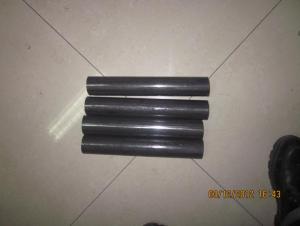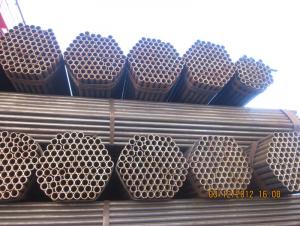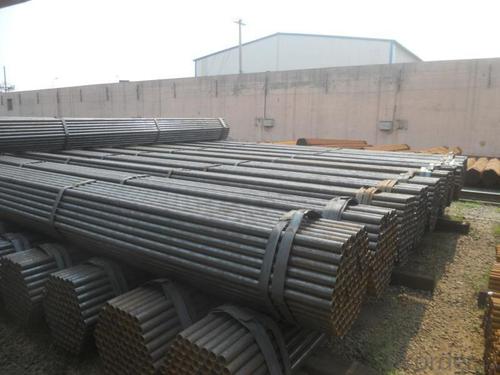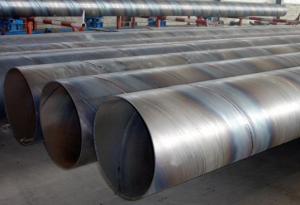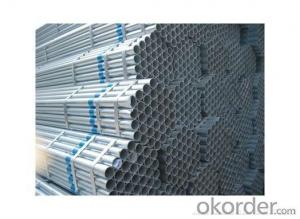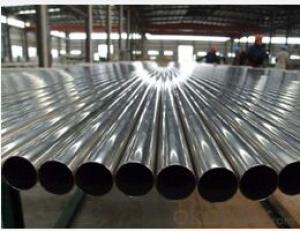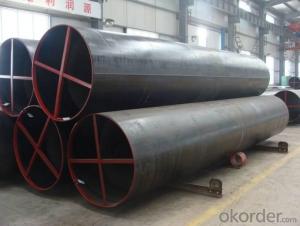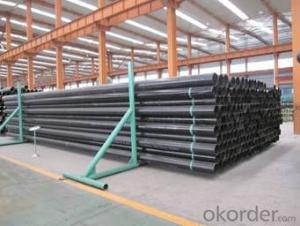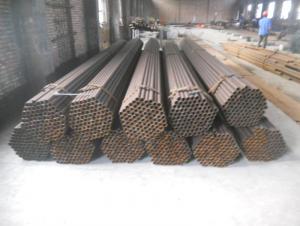ERW Welded Pipes
- Loading Port:
- Tianjin Port
- Payment Terms:
- TT or L/C
- Min Order Qty:
- 50MT m.t.
- Supply Capability:
- 50000Ton Per Month m.t./month
OKorder Service Pledge
OKorder Financial Service
You Might Also Like
Specifications of ERW Welded Pipes,
Application of ERW Welded Pipes:
It is widely applied to line pipe and casing and tubing in oil transportation and casing field, and it is used in Low,high pressure liquid and gassy transportation and it is also good Structure pipe (for furniture, window, door, building , bridge, mechanical etc).
Standard of ERW Welded Pipes: API SPEC 5L, API SPEC 5CT, ASTM A53, GB/T9711.1
Steel Grade of ERW Welded Pipes:API SPEC 5L: B, X42, X46, X52, X56, X60, X65
API SPEC 5CT: J55, K55, N80, L80-1
ASTM A53: A, B, C
GB/T9711.1:L242、L290、L320、L360、L390、L415、L450
Sizes of ERW Welded Pipes:
Standard: GB/9711.1
Mechanical Properties
Remark: Besides below sizes, we also can arrange production based on requirement of customers
|
OD |
WT |
WEIGHT | ||||
|
INCH |
MM |
SCH |
MM |
INCH |
KG/M |
LB/INCH |
|
1 1/2” |
48.3 |
STD-40 |
3.68 |
0.145 |
4.09 |
2.75 |
|
1 1/2” |
48.3 |
XS-80 |
5.08 |
0.2 |
5.47 |
3.68 |
|
2” |
60.3 |
STD-40 |
3.91 |
0.154 |
5.49 |
3.69 |
|
2” |
60.3 |
XS-80 |
5.54 |
0.218 |
7.56 |
5.08 |
|
2 1/2” |
73 |
STD-40 |
5.16 |
0.203 |
8.72 |
5.86 |
|
2 1/2” |
73 |
XS-80 |
7.01 |
0.276 |
11.52 |
7.74 |
|
3” |
88.9 |
STD-40 |
5.49 |
0.216 |
11.41 |
7.67 |
|
3” |
88.9 |
XS-80 |
7.62 |
0.3 |
15.43 |
10.37 |
|
3 1/2” |
101.6 |
STD-40 |
5.74 |
0.226 |
13.71 |
9.21 |
|
3 1/2” |
101.6 |
XS-80 |
8.08 |
0.318 |
18.83 |
12.65 |
|
4” |
114.3 |
STD-40 |
6.02 |
0.237 |
16.24 |
10.91 |
|
4” |
114.3 |
XS-80 |
8.56 |
0.337 |
22.55 |
15.15 |
|
5” |
141.3 |
STD-40 |
6.55 |
0.258 |
21.99 |
14.78 |
|
5” |
141.3 |
XS-80 |
9.53 |
0.375 |
31.28 |
21.02 |
|
6” |
168.3 |
STD-40 |
7.11 |
0.28 |
28.55 |
19.19 |
|
6” |
168.3 |
XS-80 |
10.97 |
0.432 |
42.99 |
28.89 |
|
8” |
219.1 |
STD-40 |
8.18 |
0.322 |
42.98 |
28.88 |
|
8” |
219.1 |
XS-80 |
12.7 |
0.5 |
65.3 |
43.88 |
|
10” |
273 |
STD-40 |
9.27 |
0.365 |
60.9 |
40.92 |
|
10” |
273 |
80 |
15.09 |
0.594 |
96.95 |
65.15 |
|
12” |
323.8 |
STD |
9.53 |
0.375 |
74.61 |
50.13 |
|
12” |
323.8 |
40 |
10.31 |
0.406 |
80.51 |
54.1 |
|
12” |
323.8 |
XS |
12.7 |
0.5 |
98.42 |
66.14 |
|
12” |
323.8 |
80 |
17.48 |
0.688 |
133.38 |
89.63 |
|
14” |
355.6 |
40 |
11.13 |
0.438 |
95.51 |
64.18 |
|
14” |
355.6 |
XS |
12.7 |
0.5 |
108.48 |
72.9 |
|
14” |
355.6 |
80 |
19.05 |
0.75 |
159.71 |
107.32 |
|
16” |
406.4 |
XS-40 |
12.7 |
0.5 |
124.55 |
83.69 |
|
18” |
457 |
STD |
9.53 |
0.375 |
106.23 |
71.38 |
|
18” |
457 |
40 |
14.27 |
0.562 |
157.38 |
105.75 |
|
18” |
457 |
80 |
23.83 |
0.938 |
257.13 |
172.78 |
|
20” |
508 |
40 |
15.09 |
0.594 |
185.28 |
124.5 |
|
20” |
508 |
80 |
26.19 |
1.031 |
314.33 |
211.22 |
Picturers of of ERW Welded Pipes
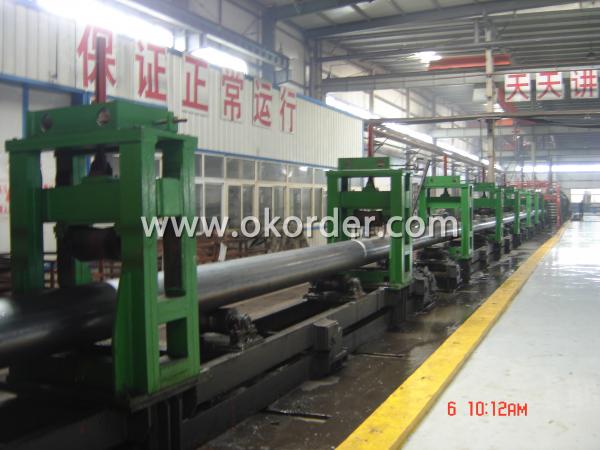
Hi-tech for ERW production line.
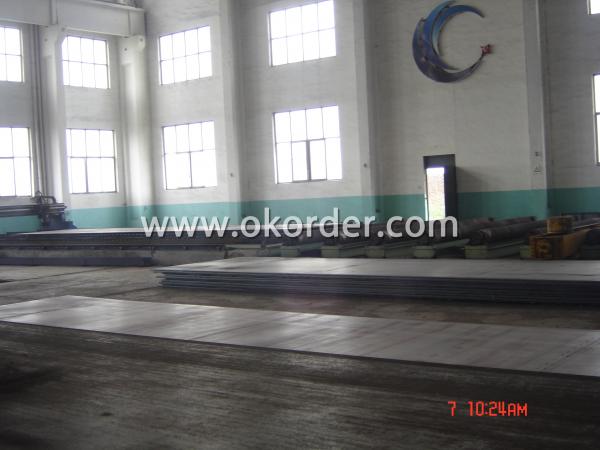
Coils to product ERW.
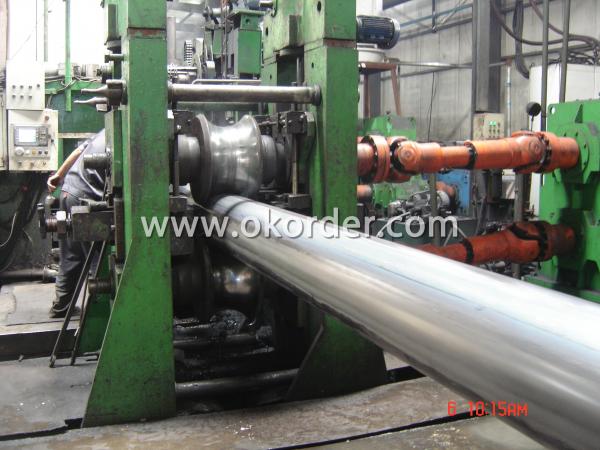
Production line with professional and experienced teams.
Welcome to contact us for ERW Welded Pipes .
- Q: How are steel pipes classified based on their schedule?
- Steel pipes are classified based on their schedule, which refers to the thickness of the pipe walls. The schedule classification system includes different numerical values, such as Schedule 10, Schedule 40, and Schedule 80, to categorize pipes with varying wall thicknesses.
- Q: Can steel pipes be used in earthquake-prone areas?
- Yes, steel pipes can be used in earthquake-prone areas. Steel is a strong and durable material that can withstand the forces generated during an earthquake. The flexibility and ductility of steel allow it to absorb and dissipate the energy of seismic waves, reducing the risk of structural failure. Additionally, the ability to weld steel pipes allows for the construction of robust and earthquake-resistant structures. However, it is important to ensure proper engineering and construction practices are followed to ensure the steel pipes are installed and connected correctly to maximize their earthquake resistance. Local building codes and regulations should also be considered to ensure compliance and safety in earthquake-prone areas.
- Q: How are steel pipes used in desalination plants?
- Steel pipes are used in desalination plants to transport and distribute the seawater and treated water throughout the facility. They are durable and resistant to corrosion, ensuring the efficient and reliable movement of water in the desalination process.
- Q: Can steel pipes be used for pharmaceutical manufacturing plants?
- Yes, steel pipes can be used for pharmaceutical manufacturing plants. Steel pipes are known for their durability, strength, and resistance to corrosion, making them suitable for transporting various fluids and chemicals used in pharmaceutical production. Additionally, steel pipes can be easily sanitized and meet industry standards for cleanliness, making them a reliable choice for pharmaceutical manufacturing facilities.
- Q: What is the fatigue strength of steel pipes?
- The fatigue strength of steel pipes refers to the maximum stress level that the pipes can endure without experiencing fatigue failure or damage over a given number of stress cycles. It varies depending on factors such as the steel composition, manufacturing process, pipe dimensions, and environmental conditions.
- Q: What is the difference between hot-dip galvanizing and electroplating for steel pipes?
- Hot-dip galvanizing and electroplating are both methods used to protect steel pipes from corrosion, but they differ in the process and the properties of the resulting coating. Hot-dip galvanizing involves immersing the steel pipe in a bath of molten zinc, which forms a thick and durable coating that bonds metallurgically with the steel. This provides excellent corrosion resistance and protection even in harsh environments. On the other hand, electroplating involves the deposition of a thin layer of zinc onto the steel pipe using an electric current. While electroplating also offers corrosion protection, the coating is typically thinner and less durable than hot-dip galvanizing. Hot-dip galvanizing is typically preferred for steel pipes that require long-lasting protection, while electroplating may be suitable for applications where a thinner coating is sufficient.
- Q: Where is a steel pipe casing usually used?
- Classification of casing: rigid casing, flexible waterproof sleeve, steel pipe sleeve and iron sheet bushing, etc..
- Q: How are steel pipes classified based on their thickness?
- Steel pipes can be classified based on their thickness into three main categories: Schedule, Nominal Pipe Size (NPS), and Wall Thickness. The Schedule classification is commonly used in North America and refers to the wall thickness of the pipe. It is denoted by numbers such as Schedule 10, Schedule 40, and Schedule 80, where the higher the number, the thicker the pipe. The Nominal Pipe Size (NPS) classification, on the other hand, is used internationally and refers to the inside diameter of the pipe. It is expressed in inches and is usually followed by a schedule number to indicate the wall thickness. For instance, NPS 6 Schedule 40 means a pipe with a 6-inch inside diameter and a wall thickness according to Schedule 40. Lastly, steel pipes can also be classified based on their wall thickness in millimeters or inches. This classification provides a more precise measurement of the pipe's thickness, usually referred to as the "wall thickness" or "wt" in specifications. The wall thickness is measured from the outside diameter to the inside diameter and can be expressed in various units of measurement, such as millimeters, inches, or gauge. In conclusion, steel pipes are classified based on their thickness using different systems such as Schedule, Nominal Pipe Size (NPS), and Wall Thickness. These classifications help ensure that the appropriate pipe is selected for specific applications, considering factors such as pressure requirements, structural integrity, and compatibility with other components of the system.
- Q: Is it good to buy a simple wardrobe or a steel pipe?
- Therefore, the simple solid wood wardrobe and steel pipe wardrobe is good or bad, according to personal preferences to set, and that environmental protection seems to have grades, easy to crack
- Q: What are the different types of coatings used on steel pipes?
- Steel pipes can be coated with various types of coatings to increase their durability and protect them from corrosion. Some commonly used coatings are: 1. Fusion-Bonded Epoxy (FBE) Coating: The steel pipe is heated and the epoxy powder is melted and fused to the surface. FBE coatings offer excellent corrosion resistance and are widely used in water pipelines and the oil and gas industry. 2. Polyethylene (PE) Coating: Similar to FBE coatings, PE coatings are applied to steel pipes. They provide a protective layer that is resistant to moisture, chemicals, and abrasion. PE coatings are commonly used in gas pipelines and underground water pipelines. 3. Polypropylene (PP) Coating: PP coatings have similar application processes and protective qualities as PE coatings. However, they offer enhanced resistance to higher temperatures, making them suitable for chemical processing plants and refineries. 4. Concrete Weight Coating (CWC): This special coating involves applying a layer of concrete to the steel pipe. It adds weight to the pipe, making it more stable and resistant to buoyancy in underwater or submerged applications. 5. Zinc Coating: Zinc coatings, such as hot-dip galvanizing, involve immersing the steel pipe in molten zinc. This creates a protective layer of zinc on the pipe's surface, offering excellent corrosion resistance. Zinc coatings are commonly used in outdoor applications, such as fencing, guardrails, and water pipelines. 6. Bituminous Coating: Bituminous coatings involve applying a layer of bitumen or asphalt to the steel pipe. They provide excellent resistance to water and chemicals, making them suitable for underground pipelines and structures. These examples illustrate the variety of coatings available for steel pipes. The choice of coating depends on factors like the intended application, environmental conditions, and desired level of corrosion resistance.
1. Manufacturer Overview
| Location | Tianjin, China |
| Year Established | 2004 |
| Annual Output Value | 250,000Tons |
| Main Markets | Europe; South America; Americas;etc. |
| Company Certifications | API 5L;API 5CT;ISO 9001:2008 GB/T 19001-2008;ISO 9001:2008 |
2. Manufacturer Certificates
| a) Certification Name | |
| Range | |
| Reference | |
| Validity Period |
3. Manufacturer Capability
| a) Trade Capacity | |
| Nearest Port | Tianjin |
| Export Percentage | 50% - 60% |
| No.of Employees in Trade Department | 1000-2000 People |
| Language Spoken: | English; Chinese; Spanish |
| b) Factory Information | |
| Factory Size: | Above 70,000 square meters |
| No. of Production Lines | Above 8 |
| Contract Manufacturing | OEM Service Offered; Design Service Offered |
| Product Price Range | Average |
Send your message to us
ERW Welded Pipes
- Loading Port:
- Tianjin Port
- Payment Terms:
- TT or L/C
- Min Order Qty:
- 50MT m.t.
- Supply Capability:
- 50000Ton Per Month m.t./month
OKorder Service Pledge
OKorder Financial Service
Similar products
Hot products
Hot Searches
Related keywords

